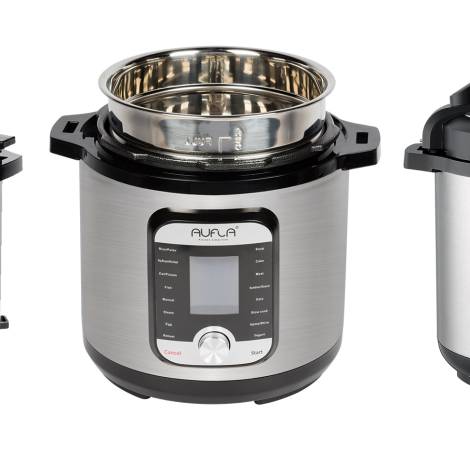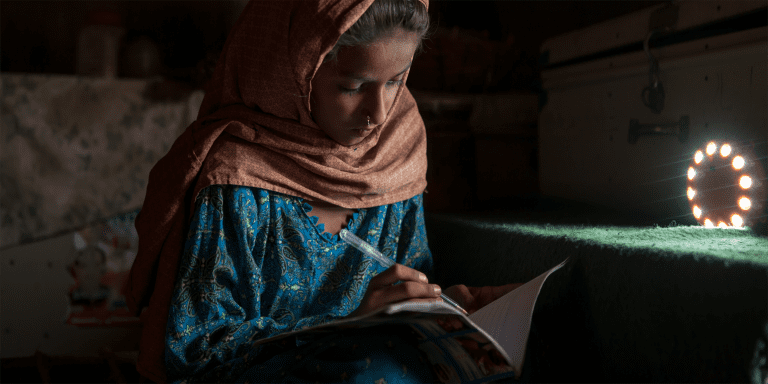Favorable public policies and motivated business ventures converge to place clean cooking technologies into Indian kitchens.
When Yash Parmar began designing a clean cooking device, his goal was clear. The young engineer was convinced that most people expect to be able to cook quickly and conveniently, without losing the taste and quality of the food. His mission would be to simplify the cooking process.
With that hypothesis in mind, the Indian entrepreneur decided to create a new smart cooking prototype. Parmar traveled to China to learn more about the manufacture of cooking devices, exploring how to adjust his design to the tastes of his country’s recipes.
Thus he founded AUFLA Smart Cooker, a brand dedicated solely to producing smart electric pressure cookers “Made in India.” In other words, the raw materials and advanced manufacturing of the prototypes are entirely local.
By modernizing Indian kitchens, the cookers help advance the United Nations’ Sustainable Development Goal 7, “Ensure access to affordable, reliable, sustainable and modern energy for all.”
AUFLA now sells cookers with capacities of 3, 5 and 6 liters, with 4 liters coming soon. The aluminum outer body of the cookers have a thickness of 0.6 mm, thicker than similar products that are usually 0.4 mm. AUFLA’s cooker also has a hard-anodized inner pot that is not bioreactive, leaving no metallic tastes in food.
“People can make various Indian dishes according to local tastes. The wires used inside the kitchen are fireproof and there has not been a single defective part returned or a complaint from any customer” states Parmar on his venture’s website.
AUFLA Smart Cooker was selected as one of 13 best-in-class, affordable, electric pressure cookers (EPCs) by the 2020 Global LEAP Awards. This recognition distinguishes initiatives that focus on underserved markets, located in areas with weak electricity connections, as well as areas where power comes from small-scale solar systems. Mr. Parmar’s project stood out because expert measurements showed that AUFLA’s electric stoves consume only 7-8 rupees of electricity when used for three hours.
Despite his successes, Mr. Parmar maintains concerns about the obstacles confronting a venture like his. Parmar spoke at the 12th series on Transitioning to Modern Energy in Cooking, organized by Modern Energy Cooking Services (MECS), one of the initiatives of the Entrepreneurship Development Programme in India.
“The challenge we face is that people have not yet adapted to this type of pressure cooker. Many think that the device is a microwave-type concept, but I would like to clarify that my article has nothing to do with radiation. It is 100 percent safe and no nutrients are lost during cooking,” Mr. Parmar said.
While the culture may be slow to adopt the technology, projects such as Mr. Parmar’s are beginning to receive support from the Indian Government. India has taken the first steps to put in place a policy to develop pilot project capabilities and innovation in clean cooking technologies.
The government’s priority is to develop India’s capacity as a global manufacturing center for clean cooking appliances, Rahul Kulshreshtha, a member of the office of the Principal Scientific Adviser to the Government of India, expressed during the MECS presentation.
Another project supported by the Indian government and MECS is Rudra Solar Energy. This social venture manufactures cooking modules that use photovoltaic cells and other solar energy technologies to prepare food in vulnerable communities.
One of Rudra’s flagship products is the solar oven for baking food. Devang Joshi, developer of that initiative, says it is a simple construction and works on the same principle as a solar stove.
“It has been designed in such a way that it has a longer heat storage life, stability and a wider temperature range above 150°-180° C (300°-350F). Our solar ovens could be used for making simple dishes, but also for industrial moisture removal applications,” Mr. Joshi revealed during the series of talks on transitioning to modern energy in cooking.
Since Rudra Solar Energy began its work in 2006, the venture has become involved in the lives of many Indian people in economic need.
According to Mr. Joshi, the next challenge is to manufacture more customized products. New custom designs will meet the specific needs of customers who want to experiment with clean cooking processes.
For more information on MECS talks please see mecs.org.uk.
About the Author
Claudia Alemañy Castilla is the 2022 Engineering for Change Editorial Fellow and an award-winning journalist who splits her time between homes in Cuba and Spain. Among her accomplishments, Ms. Alemañy Castilla has developed the COVID-19 Cuba Data Project for Juventud Técnica Magazine in Havana, Cuba, where she was a staff reporter specialized in science, technology and environmental journalism. She has also reported for Women in Science (a publication of País Vasco University), the Cuban Institute of Cultural Research ‘Juan Marinello,’ and others.


No Comments.